Preface:
This has been one of the hardest blogs I've written. In it I describe our visit to an Akha hill tribe village in Northern Laos. While trying to describe this unique and authentic village I do not wish to bore you all to tears with every little detail nor is it my desire to diminish nor trivialise the experience and the impact it has had on me. We arrived in Luang Prabang severely weakened by serious intestinal distress brought on by a meal of shonky fish in Pakse the night before we left. We postponed our tour of the Akha Village by 3 days in the hopes of regaining enough strength to make the 3 hour trek up the mountain by foot. Two days before we were to depart I slipped at the top of a steep staircase in the guesthouse we were staying in at Luang Prabang and toppled down at least 12 steps, damaging the ligament in my right knee. I was lucky not to have broken any bones. We contacted our tour operator to ask if there was an alternate route to the village; if not we would have had to cancel. Luckily they were able to find and alternative and so the journey begins.....
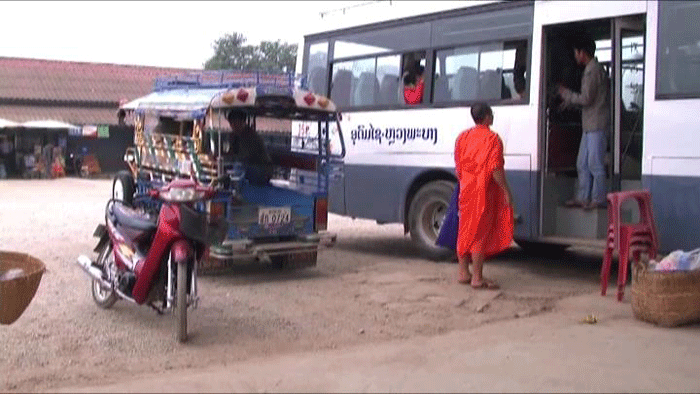
Upon arrival at Luang Prabang's north bus station, early on the 4th of December, it soon becomes apparent that there are more tickets sold than there are seats on our bus. I realise then what the stack of plastic stools outside the bus is for. Luckily we found real seats as the bus filled quickly. Everyone left standing was given a plastic stool which they placed in the aisle wherever they could find space between the sacks of rice and other paraphinalia. Our fellow passengers were an eclectic mix, included young and old, Lao and minority groups, a novice monk and a duck. The duck didn't have to sit on a plastic stool, it was tucked in a sisel bag with just his head protruding, I guess so he could enjoy the view from under his owner's seat. I'd like to fantisize the he was destined to enjoy a long and fruitful life as a much cherished family pet, but in reality he was probably more likely to become the Lao equivalent of 'Duck l'orange'.
The weather was cool and crisp and our route followed rivers that cut deep crevices between steep rugged mountain peaks which were swathed in mist as thick as cotton candy. Along the route tall stands of teak trees with their giant papery leaves cast long shadows across the road, and were interspersed with rice terraces, banana plants and a scattering of rural villages that clung tenaciously to the sliver of steep land that separates the bitumen from the river below. With grass thatched roofs and woven bamboo matting for walls, they perch precariously on stilts, defying all laws of physics. The poverty is obvious as the inhabitants live their lives on the dusty verge, bathing, washing, cooking in full view of all passers-by yet each rough thatched hut has its own satellite dish. Even these trappings of modern day life are put to more than one use; reeds, shoes and clothes are draped over them to dry in the filtered morning sunlight.

Along the narrow winding road the bus rumbles, scattering flocks of turkeys, scrawny hens with clutches of fluffy chicks, stray piglets, and hordes of children, many with younger siblings strapped to the backs.
As we climb into the hills of Northern Laos the road appears to have been hacked from a steep cliff face, on one side a sheer drop to the valley below. We cross rickety bridges over deep ravines, and we hold our collective breath and pray that it will hold and that our combined weight does not tip us over the limit. Severely eroded sections of the cliff face bear the scars of the previous wet season's landslides; testament to the hazards of travelling this route in summer.
After 6 hours and only one potty stop, at a dubious service station, our bus finally arrives at Oudamxai where we alight and have lunch in a cafe at the dusty bus depot.

Two hours later our second bus departs for Muang Khua. It was a smaller bus licensed to carry 25. With 34 passengers it is just as overcrowded though this time it comes equipped with jump seats in the aisles allaying the need for the plastic stools.
A young girl, no more than 16 years old and dressed in the traditional costume of the Akha people, boards the bus with her young baby, 5 or 6 months old. The poor girl is sick as a dog for the entire duration; probably already pregnant with her next offspring and her baby cries inconsolably for at least half of our 3 hour journey. We're later told that if a baby cries the Akha people believe it is a sign that there is a bad spirit nearby. Now we understand why all the locals were giving us suspicious looks. Luckily, when some people alighted at Paknamnoi the baby stops crying and that, thankfully, lets us off the hook.
After stopping to drop off a few passengers at random villages along the road, it's dark by the time we pull into the bus depot at Muang Khua. Hubby and our guide, Souk, (pronounced Suk) go in search of accommodation. After inspecting 3 guesthouses hubby declares the last one the best of the bad lot; at least it has a hot shower. I guess we couldn't have expected more for $5 a night.
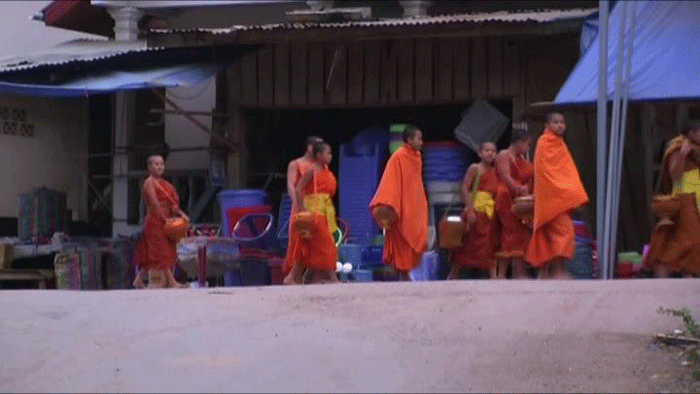
After an average night's sleep, the next morning we embark on the final leg of our journey, a minivan had been hired to deliver us to the Akha Village of Ban Hong Lerk, 'Village of the Deep Lake'. We stopped at a fork in the road where our trail looked little more than a goat track along the ridge of the mountain. The locals encouraged us to continue; cars like this, we were told, drive this road every day. It was very hairy, narrow with nothing but a sheer drop down the mountain on each side. We kept our fingers crossed that we would not encounter anyone coming in the opposite direction as there was no overtaking lane.
Eventually we made it to the entrance of the village and passed under their totem which we had been advised not to touch. The father of the village chief led us to the home of the deputy Chief, Poulou, where we are to be billeted at least for the first night.

The village is a haphazard group of timber and bamboo thatched huts built on the slope of the hill running down to a valley below. Each hut is enclosed by a rough bamboo fence creating the family compounds where a menagerie of farm and domestic animals run free. Pigs, chooks, ducks, cows and other animals fight for space and scraps within each tiny, dusty yard.

The house of our host family, like most houses in the village, consists of two levels. The first, approximately 9m x 4.8m, has a bare earthen floor and serves as the kitchen, family and store area. All the cooking is done over an open fire, there is no chimney or windows on the ground floor. The upstairs is about 6m x 4.8m and has timber floor boards and a gabbled tin roof and bare rafters. There are two small sectioned off sleeping areas, the remainder, a large open plan area, covers about 60% of the upper floor. The walls are rough-hewn timber with gaps so wide, you can not only see through them, you can also poke your whole fist through them. The floor has tightly woven bamboo mats covering the floorboards in the dining section. There is no furniture in the house. Every task is completed sitting on the floor, or squatting on haunches.

This is home to 13 people of the one extended family, spanning 4 generations, including Poulou, the deputy chief, (23) his wife (26) their two children aged 6 and 2 who all occupy the smallest sleeping room, a lean to about 1.2m x 2.4m that has been added to the end of the house. Poulou's 13 year old sister has a curtained off area the size of one mattress. The rest of the family, 8 people, including at least 3 children, that I could count, sleep in the larger enclosed area about 2m x 3m. The remainder of the space upstairs is used as a family area and guest dining area; most of the family eat their meals on the bare earth floor down stairs.
Our bedding is rolled up against one wall. All three of us, our guide, hubby and I are to sleep side by side. How cozy! Hubby is taking no chances and commandeers the middle sleeping mat.

The mats are stuffed with kapok till they are rock solid and covered with a rough, hand-woven, hemp fabric. At the head of each bed is a thin hard pillow, also stuffed with what I presume to be more kapok, also covered in hemp. On the opposite wall is a door leading to a small deck, an area to escape from the constant smoke that waft up from the kitchen below.
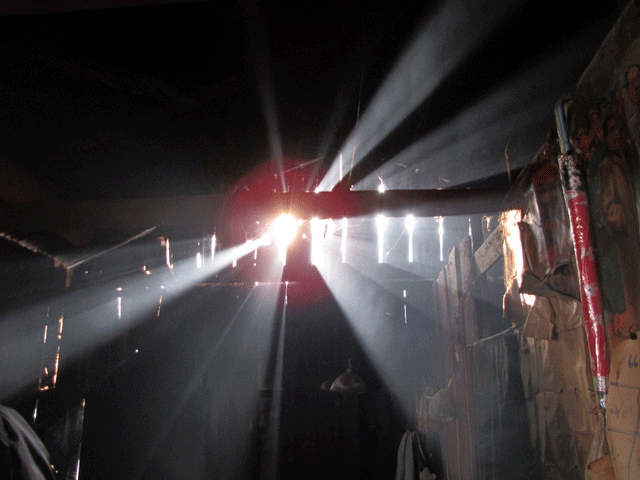
There is no indoor plumbing in any house in the village. The young girls, not much older than 5 or 6, carry baskets on their backs with straps suspending them from their heads with a few 5 litre jerry cans in the baskets. They walk about 300 meters down to the communal bathing/washing/water area, climb over the 4-6 rung bamboo ladder and into the bathing area, a concrete pad 6m x 3m with one pipe with a stop cock on it mounted at about 1.5m. They fill their jerry cans then carry them back up the path to the house. This happens a few times a day.
There are no garbage bins, everything they use is biodegradable, kitchen waste is tossed out the front door and the pigs, fowl and dogs fight over the choicest morsels. Occasionally some modern rubbish is inevitable; the batteries from the LED lights they use over our dining area are also disposed of in the same fashion unfortunately.
Our meals are shared with 5 or 6 men, some from this family, and some other guests from the village. The women bring all the food up to the second level then disappear downstairs to dine with the children, all sitting on the bare earth floor. Upstairs the honoured guests and the men sit on the bamboo mats in the middle of the room around a large enamel serving tray laden with various dishes of soup, vegetables and meat plus bowls of sticky rice. We are all presented with a small china bowl of rice wine. Everyone must drink it and two servings must be consumed before the meal can commence. The bowls are no bigger than a shot glass but the rice wine is home-made and lethal, it burns all the way down.

Eventually I have to ask the inevitable question; "where is the loo?". I'm advised that everyone in the village just goes 'bush'. Perhaps they interpret the expression on my face; my screwed up nose and an elderly gentleman volunteers to lead the way to the one and only toilet that has been provided purely for the use of the handful of tourists who join these volunteering expeditions each month during the dry season. We wind our way along barren earth paths dodging the effluent of the multitude of pigs, dogs, water buffalo and other cattle who roam freely throughout the village. We climb over bamboo stiles between neighbouring compounds, and through neighbour's yards. I am directed to a small, two-door shack of rough-hewn timber, 1.5m x 2m, one door opens and a blocked squat toilet is deemed unsatisfactory, the other door opens to a suitably unblocked squat that appears quit clean by comparison. A bucket of water stands adjacent with a plastic scoop; this is the flushing mechanism. A group of young children are fascinated by this building and peer through the gaps in the slats to inspect the goings-on within. My guide shoo's them away and I am afforded an iota of privacy. I do not tarry.

Mission accomplished, we meandering through the village on what appears to be the 'Cook's Tour'. At the apparent culmination, I am pointed in a random direction and left to find my own way back alone. As one who was born with an innate sense of direction it is unusual for me to become lost, I encounter bewildered looks from locals, children hide behind their mother's skirts or scamper back across the timber thresholds to observe me from the security of their homes. These people are still not accustomed to the sight of large, white, middle-aged women meandering through their rustic village. Eventually I succeed, after a few false turns, to find the right rustic hut out of the 75 that all look the same.

Once the children return from school in the afternoon, Souk takes us on a tour of the village. He had suggested we buy a bag of balloons in the township before we arrive here. They sensibly discourage visitors from giving sweet or candy to the children and the balloons seem to impress the children greatly. We have become pied pipers as we walk through the village distributing balloons. Children pour out of every house. We blow up the balloons for the littlies and leave it up to the older children to inflate their own. Even the mothers love to receive balloons, most are little more than girls themselves.
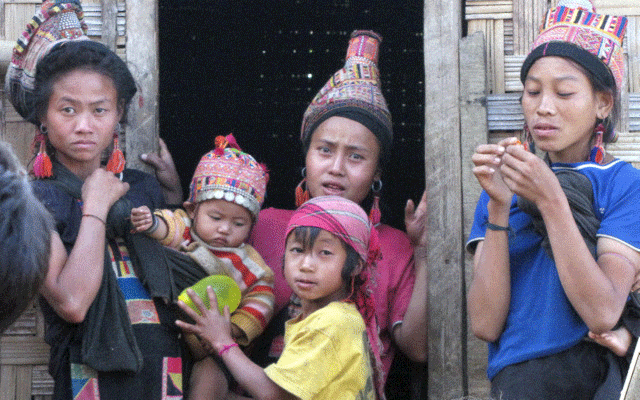
A stringy chook has been sacrificed and plucked for our dinner, and is served with green weedy vegetables in a thin soup with more bowls of rice, but not before the obligatory 2 serves of rice wine are offered up. We are hoping it will at least help us sleep tonight.
After our meal the big wigs in the village materialise and an agenda for our volunteering activities is debated ad nauseam. They take into consideration my damaged knee and try to find something I can fruitfully participate in. Finally it is decided, the next day we will help with the threshing of the rice. We are told that it is an easy half hour walk with a very short up hill section. The day after that I will teach English in the school in the morning and in the afternoon we will do some rice basket weaving. Everyone seems happy with the plan and leaves. It is 8 pm, the sun has well and truly set, so everyone who is left in the house goes to bed. We settle in, side by side with our guide.
The next morning we awake tired and sore. On our first night we have hardly slept, the beds are hard and lumpy, the blankets insufficient and in the end I wear my coat to keep me warm. All through the night a cacophony of noises leaves barely a moment's silence; dogs barking as if their very lives were in mortal danger, one pack setting off the next, which sets off the next, right around the village, roosters crow all night, babies cry and people talk albeit in hushed tones, the walls are paper thin.
Before the sun has even risen, around 3 am, the village bursts into life. People are off to work, singing and chatting among themselves. Breakfast, which for all intents and purposes, looks like last night's leftovers, is served at 7 am and is accompanied by, shock, horror, another two serves of rice wine each; For Breakfast!
A chap arrives to lead us to our rice threshing task. He carries a small black chook with him; our contribution to lunch. The promised half hour walks takes well over one hour with an incredibly steep decline down the face of the mountain. My painful knee complains; I take no notice.

It would not have been so bad, but when we finally arrive it becomes apparent that the owner of the field, whose rice we are to thresh has not been informed of the decision last night and is nowhere to be seen. Without his presence no one is supposed to touch his hillock of rice freshly scythed from the fields on the side of the mountain. We hang around aimlessly for a while hoping he will materialise. In the absence of any real chance of doing the job, we are given a brief demonstration as to how the rice is threshed using the latest word in Akha technology; a pedal-powered threshing machine. It is little more than a 40 gallon drum with spikes sticking out of it, as it spins they separate the grain from the stalks. Hubby tries his hand at it but I think the guide is more than a little disappointed; for all his grand size and bulk, this white fella is hopelessly inefficient at the task.

After a brief respite we return the way we came, back up the steep, steep hill. It seems to be unending but finally we are back at the track that leads to the village. We rest for a period against the 35 kg bags of rice, the product of yesterday's threshing. They have been carried up this path on the backs of the women of the village suspended by strapped from their foreheads. These women, when you see them, look like they will snap in a strong breeze; they are tiny and sinewy but immensely strong. Eventually a motorbike arrives with two men riding it, it's the owner of the field, he informs us that today is a festival and no one is working. I'm offered a lift back to the village on the motorbike. I gratefully accept. My knee is killing me. Not far along the way we happen across a woman carrying a heavy load on her back coming from the village. The bike stops. The woman glares at me with looks that could kill, perched on the back of this bike. Perhaps it's his wife. Heated words are exchanged. As we ride off, he continued with his tirade, though I doubt she could hear, we are already metres away. I hope I'm not the cause of a domestic dispute.

We decide, that in order to be within walking distance of the loo, we will spend the next two nights at the now defunct 'Nature Lodge', a dodgy bamboo hut that is in the process of being eaten by borers of some description. Upon closer inspection, one section looks reasonable and we agreed between the three of us that it's worth giving it a try. Half a dozen people are there when we arrive including a clutch of kids who take great delight in running in and out, squealing with glee every time one of us looks at them. The men are bringing sleeping mats, blankets and pillows and a mosquito net. The mats and blankets look newer than the ones in Poulou's house, but upon closer inspection are no softer. They are also considerably narrower as are the blankets.
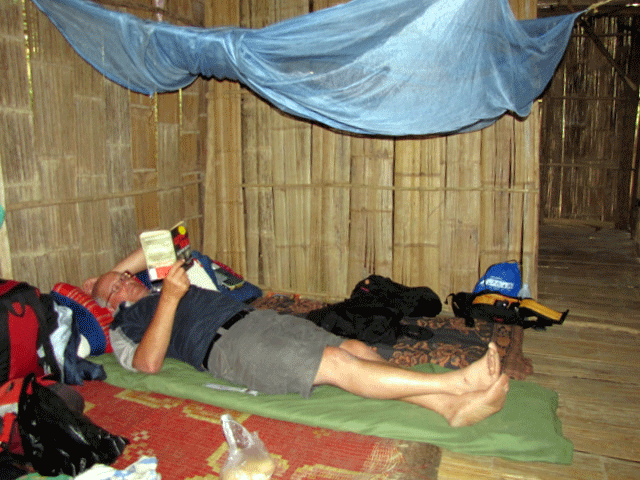
The half dozen blokes have settled on our front veranda and seem in no hurry to leave. I mention that a kettle and glasses would be handy and before I know it, someone else arrives with these items. A fire is started in the sand hearth which constitutes our kitchen and the kettle soon boils. Coffee and tea is served to all who wish to partake.

The location of the Guest Nature Lodge has been carefully selected by some genius. It affords an uninterrupted view overlooking the public bathing area where all the locals get down to their jocks and sarongs and bathe under the stream from the one water pipe. I wonder whose great idea this was?
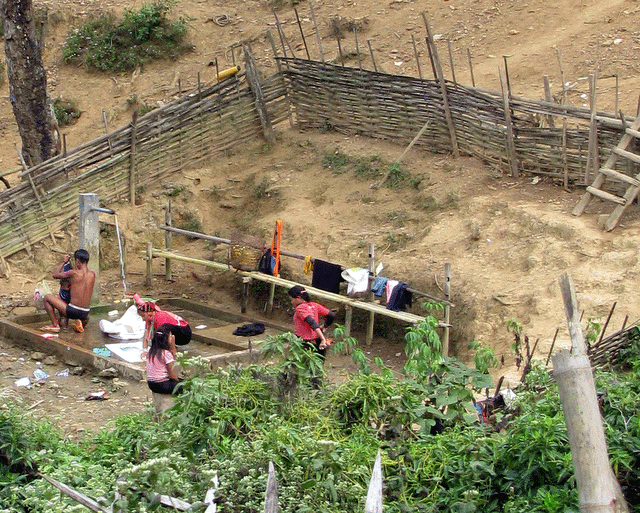
Meanwhile Hubby decides it's time to join the locals and have a wash. He strips down to his board shorts, braving the intense scrutiny of all and sundry and heads to the bathing area. The men on the veranda are all suitably impressed by his quantity of body hair, which covers most his large torso, front and back. He gets the two thumbs up from the Chief's father. At the bathing area he is stared at by all present and soon attracts more who had received word through the grape vine and arrive to view this amazing spectacle. They are even more intrigued when he lathers his face to shave. When he returns I decided it's my turn. I kept my sarong on though and while I was carefully scrutinized, do not appear to have the same crowd pulling capacity as Hairy Hubby.
After returning from our ablutions we decide to take a siesta. No one seemed in a rush to leave and, in fact, more people continue to arrive. People walk in and out all afternoon to inspect our lodgings and I expect, to help keep us company. With fewer than 13 people living in our house we must appear lonely to them. Nobody thinks to knock. "Su casa es mi casa." (your home is my home)
By next morning we are happy with the decision we made to move in here. We have slept a bit better, the beds are still rock hard and the blanket not quite wide enough to cover all of the body at once. I sleep in my coat again but am warmer, surprisingly given the ventilation through the open weave walls. We are without a lighter to start the fire. No sooner do I say this than out of nowhere a man arrives with a fire stick and the kettle is set to boil.
After breakfast we head to the school where I am to take their inaugural English lesson. The school building is a rough timber hut, divided across the middle with a door at one end for the grades 1, 2 and 3 and a door on a side wall near the other end for grades 4, 5 & 6. The kids in both classes vary in age. Mine are between 10 and 15; 11 boys and 4 girls. Children generally start school when there is another sibling old enough to take responsibility for all the younger siblings, usually around 8 or 9 years of age, or if they are lucky enough to be the youngest sibling they may start school at 6 years of age like the city children do.
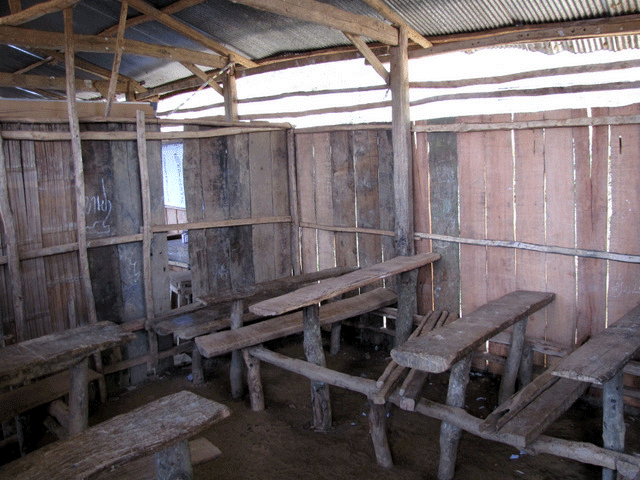
The lesson starts off slowly with the kids being so shy they are reluctant to join in. Eventually the show kicks off and they gain some confidence learning the basic greetings and to count from 1 to 20. At some point word has spread to older children who have finished primary school and two or three older boys join the class, squeezing onto the rough-hewn benches with the others. We do some mathematics with the numbers they have learnt. School finishes for the lunch break at 11:30 and I don't know who is more tired, the kids or I.

When we return to Poulou's for lunch we find the TV is plugged into a 12 V battery on the ground floor. Seated around are a large group of children, from various households in the village, more just walk in and find a patch of earth to sit on. There is a DVD playing, it look like a video of a gathering of minorities groups in China. This is their view of the world as they know it. The children sit riveted to the images on the screen. No one pushes of shoves, no one asks them to change it to the Disney Channel. No one has heard of MTV. I contemplating the contrast between these kids and those I see hanging out at malls and skate parks back home.
After lunch we are to do weaving of rice baskets. A lot of time is spent watching Poulou shaving the bamboo strips until they are wafer thin. It appears to be his first attempt to weave such a basket and his grandfather eventually intercedes when Poulou seems to have lost the plot. After a while it becomes apparent that we will not get to do any of the weaving ourselves. We excuse ourselves and retire to our hut to rest.
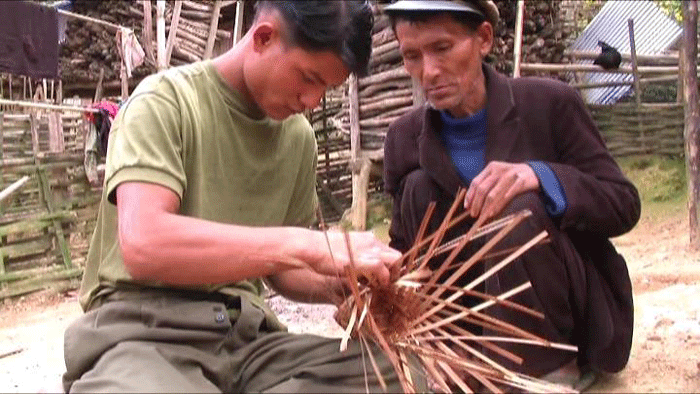
At 6 pm we return to Poulou's for dinner and the grandfather present us with the completed rice basket. We go through a farewell ceremony where the village elders tie threads and an embroidered band each around our wrists. Bestowing upon us blessing for safety, happiness and success as each is tied. We ask Souk to translate our gratitude to the family and all appear happy. Grandmother joins us around the table for the first time. We eat the whole chicken that is sacrificed for the ceremony. They eat their meals with their bare hands and part way through, Grandfather sticks his hands into the chook and extracts the heart and kidneys and presents them to Hubby and me. We feel truly honoured to be given the choicest pieces of the chook and decide to throw caution to the wind and accept the offing with gracious disregard to our strict hygiene regime, so as not to offend their hospitality.
I ask our guide to translate some questions directed to the women, none of whom speaks Lao, let alone English. All my questions have to be translated from English to Lao, from Lao to Akha then back again. I'd love to learn more about these fascinating women but it starts to sounds like a game of Chinese Whispers and I wonder how much I have missed. I would have enjoyed spending more time with the women and learning their language as it created a barrier between us. In the end we thank the family for their generosity and retire for our last night to our rustic hut.
We rise at 6 am and pack the last of our belongings before walking up the hill to Poulou's for breakfast. Grandmother joins us for a change. Usually only the men join the guest at meals. Apart from the usual rice wine, rice and pumpkin and taro, there is a bowl of small salted fish mixed with bits of small crabs, little claws and all. No chicken for a welcome change. After eating I ask to take a photo of grandmother and grandfather. They agree, but rather than posing as they are, in their working traditional clothes, they both go to change their into their Sunday best traditional costumes. They smile shyly for my camera and I promise to mail them a copy.
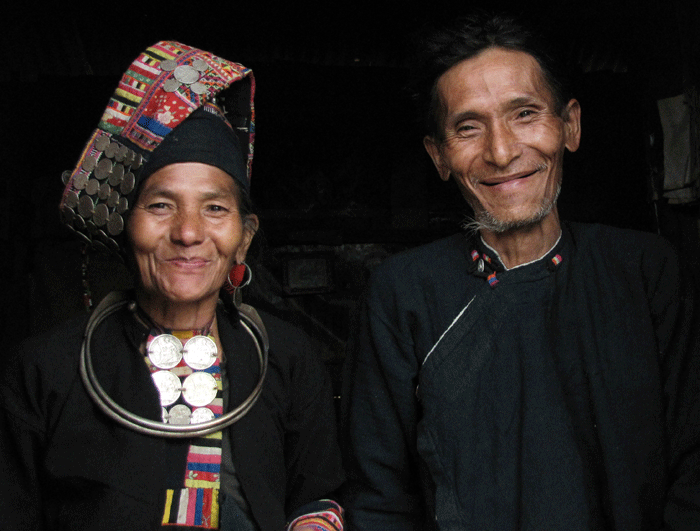
We then give them our thanks and depart, collecting our belongings from the hut before walking from the village under their traditional totem for the last time and back towards Pitcha Kao, 4 kilometres away. Not long after we arrive at the intersection between the 5th and 21st centuries, a truck laden with wood arrives and Souk flags him down. He is going all the way to Paknamnoi and agrees to take us there. Hubby and I climb into the cabin next to the driver and Souk climbs up to sit on the wood for the one hour bone jarring trip down the mountain on the rough dirt road. Along the road new electricity poles are sprouting, large coils of power cables lay waiting to be suspended from the skeletal poles. We are informed that within a year electricity will be connected to the village we have just left.
This village exists today much as it has since the first inhabitants arrived from China over 200 years ago. The Akha people originated in Mongolia about 500 AD. Most of the inhabitants still wear handmade traditional costume on a daily basis and not merely to appease the passing tourists. They still spin and dye their hand picked cotton and hemp. Weave it on hand made looms; embroider it with hand spun thread in traditional patterns handed down from mother to daughter over countless generations.

Their lives are hard and they work for little reward but no one grumbles. I am in awe of and have the upmost respect for these hard working people. Most girls never go to school. They are left to look after younger siblings from the age of 5 while their parents go out to work in the fields or hunt. When they are 15 or 16 they are married off, leaving their family to live with their groom and his family. If they are attractive their 'Bride Price' may be high; this is their worth. An educated bride will not bring a higher price. Girls are not worth educating. They work hard from cradle to grave but know no other life and are on the whole are a happy race of people. I wonder how the intrusion of electricity will impact upon their lives. When satellite dishes beam images from across the globe directly into their rustic huts, how will they react? How will the naive young people of this village come to terms with the contrast they see? How long will it take before they too want it all and start leaving their villages in droves, abandoning their heritage. The 21st century is about to arrive with a vengeance. |